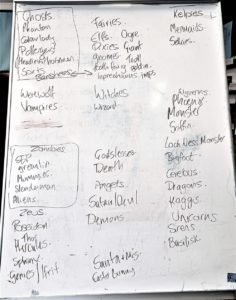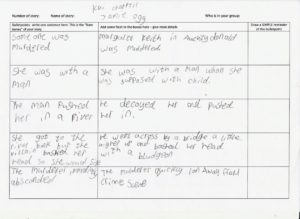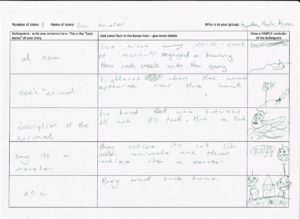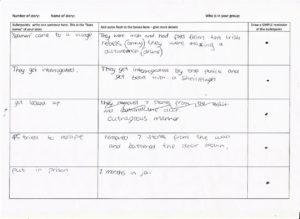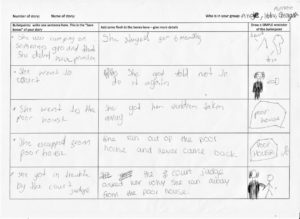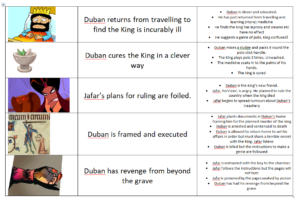“Auchance” – I couldn’t find that but maybe I couldn’t read the writing correctly. Might be Auchinhamper or Auchininna – both are in the parish of Inverkeithny.
1867-1869 ordnance survey OS Name Book Banffshire Vol 19 “Auchininna Croft – A cottars dwelling, having some outhouses, garden and croft attached, the property of Mr Rose Innes. Netherdale.” Maybe named after the Burn of Auchininna?
North Auchininna – A good dwelling house, with a court of Suitable offices, a garden, and a medium Sized arable farm attached. T.G.R. [Thomas Gilzean Rose] Innes Esqr. proprietor.
South Auchininna – A good dwelling house, with a court of farm ofices, a garden, and a first class farm attached, in the occupation of William Shearer, and the property of T.G.R. Innes Esqr. of Netherdale.
Auchinhamper – A large and nearly new farmsteading, the property of T.G.R. Innes Esqr. of Netherdale.
Auchry – Place on a slope. Achadh, place; ruigh, slope.
Balwinike – can’t find this place Bal maybe from baile meaning town
Bogside –a place next to a bog!
Banff – it may be derived from the Scottish Gaelic banbh meaning ‘piglet’, a more likely origin is the name being a contraction of bean-naomh, Gaelic for ‘holy woman’, as this would tie in with the burgh’s coat of arms which features the Virgin Mary.[ William J. Watson writes: “It is true that Banff is Banb in the Book of Deer and Banbh in modern Gaelic—one syllable. On the other hand, banbh, a suckling pig, is not appropriate—one might say it is impossible—as the name of a place or district.”
Boyndie – New Statistical Account, disappointingly says “The origin of the name is unknown” https://www.genuki.org.uk/big/sct/BAN/Boyndie
Church Street – named after the church which is on that street
Creelwell – mentioned in documents “Plans of Estates of Netherdale and others” from 1817- 1822 at National Records- plans show farms and fields with their acreages of pasture, moor, wood, plantings. In the parish of Inverkeithny. 1867-1869 ordnance survey OS Name Book Banffshire Vol 19 “A well with a good flow of fresh water well adapted for domestic purposes.”
Crooking Crashing Roadie (Banff) – debates on Banff and Macduff FB page 7 years ago about it being The
Crookie Crasher – “It was always called the Crookin Crasher. I think it just became Crookin Crashin Road when it was posh enough to get a road sign.”
Crudie – (from gaelic Cruach Dain). Knoll of judgment. Cruach, knoll, pile of stones; dain, judgment.
See also – Cruden (as in Cruden Bay) comes from Croch Dain – the slaughter of the Danes.
Cuminestown – named after the landowner who designed the village in founded in 1763 by Joseph Cumine of
Auchry
Delgaty Crescent – named after the Castle. Delgaty comes from Place of thorn(-bushes), place abounding in thorn-bushes
Deen – a common name for a valley
Errol Street – The Earls of Errol lived at Delgaty Castle and owned a lot of the land locally, including land in Turriff. William Hay of Errol became the patron (gave money to) the church in Turriff. So the roads with “Erroll” in them have been named after this local ruling family.
Fintry (a farm) – Fintry seems to come from the gaelic for The Fair Land”
Fisherford – presumably a place where people would cross a river or stream (Ford) to fish – or where fisher people would cross. It’s fair;y inland, so I would have thought it was a place to cross to get to fishing grounds.
Forglen Crescent The estate of Forglen (Foithir Gleann, meaning “the hollow of the vale” in Gaelic)
Over Foulzie – Foulzie. The name had been Cuith Phuill. meaning Cattle-fold at a pool or burn. Over time that became Ohuill Chuith. Then again over time the pronounciation changed to Fuillzui, then Foulzie, This is the origin of the surname Fowlie as a personal name (https://archive.org/stream/celticplacenames00miln/celticplacenames00miln_djvu.txt)
Gamrie/Gardenstown From the Statistical Accounts by Rev Mr Wilson “It has long been a general report, and the prevailing tradition in this country, that, some time before the year 1004, in which the church of Gamrie is said to have been built, (and there is at this day the date 1004 on the steeple), that the Thane of Buchan pursued the Danes to the precipice or brow of the hill above the church, and there defeated them with great slaughter. Several of their skulls (most likely of their chiefs who had fallen in battle) were built into the church wall, where they remain entire: From hence it came to be called by some the Kirk of Sculls. In the Gaelic language, the word Kemri, from which, probably, Gamrie is derived, signifies running step, or running leap. And this derivation seems a natural one; because, from the situation of the hill, which is one of the highest on this part of the coast, and very steep on one side, it must have been a running skirmish, and very fatal to the vanquished. In some old registers, the name of the parish is written Ghaemrie. On the said eminence, above the kirk of Gamrie, at the east end of one of the most level and extensive plains in Buchan, are a number of vestiges of encampments, which at this day are called by the name of bloody pots, or bloody pits”
Familysearch.org summarises that as The parish of Gamrie, has been known at various times as: Gamery, Ghaemrie, or Gemrie. According to tradition it derived its name from a Gaelic word, Kemrie, signifying a running leap or running fight, on account of a bloody engagement with the Danes on the spot where the old church now stands.
The current village, Gardenstown “Gardenstown and its harbour[5] were founded in 1720 by Alexander Garden” (Wikipedia)
Greenness – This name applies to a somewhat extensive tract of elevated moorland, and cultivated ground including a goodly number of small crofts or farms (1865-1871 OS Name Books) A Ness is a headland and the name may date back to the Vikings
Hatton Castle – possibly “Hatton” come from “Hall-toun” which in Scots means the farm (or ferm toun) near the Hall (or Ha). Thus the Hall must have been there first, and the name “Hatton” actually refers to the adjacent farm, now known as Hatton Farm (This is from another Hatton Castle in Angus) The Turriff Hatton was once Balquholly Castle, sometimes spelt as Balquollie, it was renamed in 1814
King Edward – The name itself has nothing to do with any “King Edward”, but is a corruption of an earlier Scottish Gaelic name. The first element “King”, usually appears as “kin” in Scottish placenames, and derives from “Ceann” meaning a headland. The second element is less certain but may derive from “Eadar” (between) or “cathair-thalmhainn” (yarrow).
The parish of King Edward has had approx 24 variations of the name: Kynedor (12th Century), Kynedward and Kinedart to name a few. (Wikipedia)
The name of this parish has long been written King-Edward, but by people living in the district it is pronouned Kin-edart, or Kin-eddar, which is supposed to be derived from the Gaelic, and, if that were so, it would mean “the head point or end of the height.” (A New History of Aberdeenshire, Alexander Smith (Ed), 1875)
Kinminty (farm) – Kinminity, Kinminty, Kinmonity, Kinmundy, all come from Ceann meaning head
Knockie Road – Knockie. Small hill. Cnocan, dim. of cnoc, hill.
Logie Aulton – Logie – howe or little hollow. Aulton is farmstead (town used to mean a farmstead or settlement with a lot of buildings, some homes, for one big farm. So Logie Aulton is an old farmstead at a little hollow.
Luncarty – Luncart is a common word in Scots for a circle of stones for holding a fire for an outdoors washing; and it is used as a place name— Luncarty. It is the same word as the Irish long-phort, a fortress. Monaidh meaning Head of the hill. C(eann, head; monaidh, gen. of monadh, hill, moor)
Melrose (farm) Melrose means the bald (treeless) hill or moor
Meadowview Place – a new street in the North West of Turriff – a perfect example of naming a place after what it is! From this spot you would get a beautiful view of the meadow (place where hay would have been grown for feed). (Unless the new houses are in the way?)
Mill Road, Turriff here it is in 1870 – leading to the Woolen Mill!. (Which was gone from the maps by 1900)
Monquhitter The name Monquhitter Signifies the place for ensnaring the deer, and was derived from the farm on which the Church was originally built (Scotlandsplaces 1800s OS)
Newton of Carnousie – “Newton” comes from a new farmsteading (there may have been an Auldtown – yes there was. Whiskey was brewed there!). Part of the lands surrounding Carnousie Castle which was a barony created in 1369 for Walter de Leslie, Earl of Ross. Carn likely comes from cairn – a pile of stones or ancient burial mound
Ordiquhill – Ordiquhill is of Gaelic original, and signifies, the ‘hollow beside the heightFrom The Statistical Account for Scotland, 1791-1799 Volume XVI, Banffshire, Moray & Nairnshire. (Celtic Place Names disagrees “Both parts of this name mean hill. Ordan, small hill, an becoming ie ; choill, coill asp., hill.
Smithy Cottaqe – a great example of a house keeping the name of the buildings original use – it would have housed a blacksmiths forge and probably home.
Station Road – from the days when there was still a railway going through Turriff. The station was where the caravan site toilets are now
and also –
The Auld Mill – The Auld Mill flats on Station Road used to be … an old mill. Here they are in the 1870 map
Teuchar – Dry shieling. Teuch, dry; airidh, shieling.
Tifty – Tifty. House of rest. Originally the name had been Tigh Taimh (pronounced tee tave), but the order of the parts had been changed in post-Gaelic the name would have been suitable for a roadside inn.
Mains of Tullo – Tula, Tullich, Tullo, Tulloch, Tullos, and Tully at the beginning of names represent tulach, a round-headed hill.
Turriff
Surnames
Acklaw – I could not find ANYTHING concrete about Acklaw!!
It’s possibly from Acklam or Aclom – places in Yorkshire after which the family was named. This comes from ‘oak wood, oak-tree clearing’ in old English.
Allen – may be derived from two separate sources: Ailin, in Irish and Scottish Gaelic, means both “little rock” and “harmony”, or it may also be derived from the Celtic Aluinn, which means “handsome”.
Anderson – son of Andrew. Andrew is the patron saint of Scotland. Andrew itself comes from Andreas meaning “man” or “manly” in Greek.
Baron – status name from Scots baron, which in the Highlands denoted a small landholder.
Benzie This unusual name is Scottish, and has two possible origins. The first of these is a form of the Scottish nickname, “Bain” used for a fair-haired person, which comes from the Gaelic word “ban” meaning “white” or “fair”. The ending “zie” means “son of”.
The second possible origin is from a pet form of the medieval personal name “Benedict”, of which the English form is “Bennet(t)”. That name means “blessed”, from the Latin “Benedictus” and was popular in the Middle Ages, chiefly due to the fame of St. Benedict
Bisset – I found two meanings. Bisset is the Scottish form of the old French “bisse” which means “fine linen” – likely from someone who deals in fine linen
Or alternatively Bisset is the Scottish form of the French “biset” or “bizet” which means dark complexioned.
Brazier is an occupational surname of French origin, meaning “a worker in brass”. It is the anglicised version of the French surname Brasier (Wikipedia)
Brooks – Brooks is thought to have been derived from both the Swedish surname Bäckland, (bäck, “brook”, “stream”) and lund (“grove”); and in English, Gaelic and Scottish from “of the brook”. The word brook derives from the Old English broc
Bruce family, also spelled Bruis, Brix, or Broase, an old Scottish family of Norman French descent, to which two kings of Scotland belonged. The name is traditionally derived from Bruis or Brix, the site of a former Norman castle between Cherbourg and Valognes in France it comes from Clan Bruce. In some cases it come from the French place name of Briouze in Orne,[1] while in others it appears to be derived from Brix in Manche, or Bruz in Brittany, both in France
Capon –Wikipedia – Capon is a Norman French surname, from the Old French “Chapon” or “Chapelain” meaning a ‘chantry priest’
Alternative meaning: The family name Capon is one of the oldest Anglo-Saxon names of Britain. It was originally a name for a person who worked as a poultry farmer, having derived from the Old French word Capone. The surname also has origins as a nickname, which refers to a young hen.
Hutton – Scottish (Fife) and English (Yorkshire and Lancashire): habitational name from one or other of the many places called Hutton most of which derive from Old English hōh ‘heel spur of land’ + tūn ‘farmstead estate’.
Chappell – topographic name for someone who lived near a chapel from Middle English chapel(l)e ‘chapel
Chisholm (from ancestry.com) “Scottish: habitational name from Chisholme near Hawick in southern Scotland which derives its name from Old English c̄se cēse ‘cheese’ (from Latin caseus) + holm ‘piece of dry land in a fen’ and refers to a waterside meadow good for dairy farming and hence for producing cheeses.”
Cruickshank – Scottish: nickname for a man with a crooked leg or legs from older Scots cruik ‘(something) bent’ (from Old Norse krókr or Old English crōc + shank(e) Old English sceanca ‘shank leg’).
Dawson – Dawson means “the son of David.’ David is a Biblical/Hebrew name meaning “beloved”
Donald – “a powerful ruler” The name Donald is derived from the Gaelic name Domhnull, or MacDhomhnuill, and the Celtic name Dubnovalos, all of which mean “world ruler” or “world-mighty”.
Duncan – Duncan the English form of Irish and Scottish Gaelic Donnchadh. That is made up of the elements donn, meaning “brown” or “dark” from Donn a Gaelic God; and chadh, meaning “chief” or “noble
Gall – As an English, Scottish Gaelic, and Irish surname, of Celtic origin, from Gall (“foreigner”). This is in turn from Latin gallus, which has borrowings (many of which are surnames) in several European languages, such as Czech Havel, Polish Gawel. (Wikipedia)
Garden – likely an occupational surname for a gardener
Gerard – This comes from of the ancient Germanic elements gēr ‘spear lance’ + hard ‘hardy brave strong’. Grant originated as a surname, deriving from the French term graund meaning “tall” and big” – found with English, French, and Scottish origins.”
Gray – In most Scottish instances, the name “Gray” is from the Germanic Scots language, and is cognate with Old English, “græg”, meaning “grey”, probably as a hair colour. (Wikipedia)
Grieve – a surname meaning an estate or farm manager.
Hulme – The Anglo-Saxon name Hulme comes from when the family resided in an area that was referred to as a holme, a slightly raised islet in a fen or partially surrounded by a stream or river.
Ironside A Scottish surname which comes from from Middle English or Older Scots irenside (Old English īren ‘iron’ + sīde ‘side’) a nickname for an iron-clad warrior or a man of great bravery.
Jamieson – son of James. James is a traditional Biblical name coming from “replacer” or “may God protect”
Johnson is a surname of Anglo-Norman origin meaning “Son of John”. It is the second most common in the United States and 154th most common in the world. As a common family name in Scotland, Johnson is occasionally a variation of Johnston, a habitational name
Keith – family name originating in Keith (the place) – according to Wikipedia, The name appears to come from a Brythonic word meaning “wood” (cf. Welsh coed), but it may also be related to the Pictish territorial division in this area, which was known as Cé. Another local tradition is that it derives from the Gaelic gaoth, meaning “wind”, since locals attest to how fiercely the winter winds blow
Killoh – Kiloh Name Meaning From Keiloch in Braemar. Recorded as Kelaugh 1444 in Aberdeenshire Place-Names. The place is known locally as The Keeloch /ðəˈkiləx/ anglicizing Gaelic an caolach ‘the narrow place. Families of that surname would have originated there
Ledingham – widespread in Aberdeenshire from the late 16th Century. The “Ham” part comes from a village or homestead. Some sources say that it means “The homestead of Leoda’s people”
Massie – I found two meanings – Massie could come from the Scottish surname Matheson (derived from the Gaelic for “son of the bear”)
OR A Norman family name originating in Macey in Normandy
MacGregor – son of Gregor – Gregor was a popular name in the middle ages and comes from ancient Greek meaning awake or watchful
McHardy – Scottish: from a Gaelic personal name which is most likely to be the English form of Gaelic Mac Mhuircheartaigh (see McCurdy ) Muircheartach is personal name composed of the elements muir ‘sea’ + ceartach ‘ruler’ hence ‘skilled seaman’
McIntosh – The English form of Gaelic Mac an Toisich ‘son of the chief’.
MacKinnon – the English form of the Gaelic Mac (son of) Fhionghuin meaning “fair born” or “fair son”.
McManus – Irish and Scottish surname: The English form of Gaelic Mac (son of) Maghnuis or Maghnus later Mánus. That is a gaelic version of the Scandinavian name Magnus made famous by St. Magnus of Orkney
McRae – Surname. The surname Macrae (and its variations) is the gaelic for MacRaith. This personal name means “son of grace”.
Michie – comes from the name Michael. Michael in turn is biblical and means “Who is God?”
Mitchell – English and Scottish: nickname for a big man from Middle English michel mechel muchel ‘big’}
Mullay – The Irish name Mullay was originally written in a Gaelic form as O Maolmhuaidh, which is derived from the word “muadh,” which has the dual meaning of “noble” and “big and soft.”
Murison – The name is predominantly connected with Aberdeenshire and is patronymic in origin, meaning “son of Muris”. Muris was a variant of Maurice, a name introduced to Scotland by the Normans.
Ogg The English form of a nickname from the Gaelic adjective “óg” meaning ‘young’ used to distinguish the junior of two people of the same personal name (typically father and son).
Robert – Bright with Glory
Ross – The name Ross is primarily a male name of Scottish origin that means Headland
Ruthrie – possibly named after Ruthrie near Aberlour (Linn of Ruthrie ie Linn Falls)
Ruadh, red, expanded into ruadhran, with dh changed to th.
Scott – a family name for someone who comes from Scotland
Sim – Scottish (Aberdeenshire) English and Dutch: from the personal name Sim(m) or Sime a short form of Simon
Skene – thought to come from the Aberdeenshire parish of the same name. Legend has it that the first bearer of the name was second son of Struan Robertson, who saved king Malcolm II (circa 1014) by slaying a wolf with his “sgian,” or “skene,” (Scottish dagger) in Stocket Forest.
Smart – The origins of the Smart surname date back to the time of the Anglo-Saxon tribes of Britain. It comes from an early member of the family who was a person who was referred to as smeart which meant that the original bearer was quick and active.
Smith – English and Scottish: occupational name denoting a worker in metal especially iron such as a blacksmith or farrier from Middle English smith ‘smith’ (Old English smith probably a derivative of smītan ‘to strike hammer’).
Stronach – nickname from Gaelic srònach ‘nosy’.!! “This interesting and unusual name is of Scottish origin and is derived from the Gaelic word ‘sronach’, meaning curious or inquisitive, used to describe someone who possessed these traits. However, it could also have been used as a nickname to describe the shape or size of a person’s nose.
Sullivan – The old Gaelic name used by the Sullivan family in Ireland was O Suileabhain, which partially comes from the word “suil,” which means “eye.” The surname probably means either one-eyed or hawk-eyed.
Swiercz – nickname from Old Polish and regional świercz ‘cricket’ (the insect).
Watson – Watson is a patronymic surname of English and Scottish origin. It means “son of Walter. In 2015, Watson was the 46th most common surname in England and the 19th most common in Scotland.
Will – This surname is now commonly found in Scotland in Aberdeenshire Angus and Kincardineshire. English: topographic name for someone who lived by a spring or stream
Wilson (Wikipedia) – comes from the Son of Will, a popular medieval name.
The medieval name Will could come from old Norse meaning “desire” or possibly the most common of these names was William, derived from elements wil and helm, meaning “desire” and “helmet”, “protection”. Wilson is the third most common surname in Scotland.
Wojcicka – a Polish family name originating in the village of Wójcice in Poland. Alternatively a derivative of the status name wójt ‘village headman’
